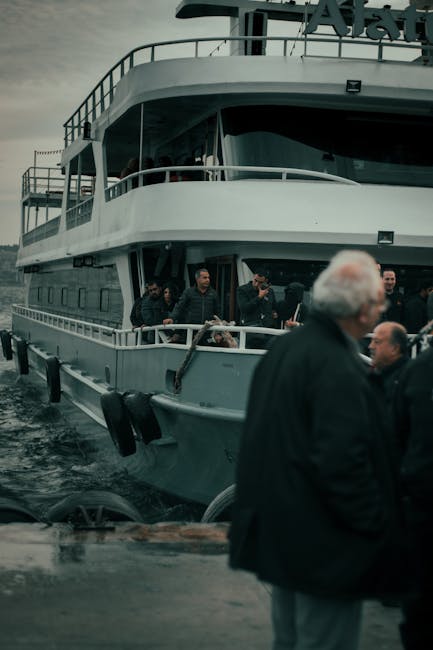Imagine setting sail on a luxurious cruise ship, the sun kissing your skin and the gentle breeze soothing your senses. As you embark on a journey of relaxation and adventure, it’s natural to wonder about the safety measures in place. One question that often arises is, “How many people fall off cruise ships?” This seemingly innocent inquiry unveils a fascinating yet sobering aspect of maritime travel. In this article, we will delve into the statistics, explore the reasons behind these incidents, and ultimately shed light on an issue that demands our attention.
While the thought of someone falling off a cruise ship may seem like a rarity, the reality is more alarming than one might expect. According to recent studies, an average of 20 people fall off cruise ships each year. This shocking statistic challenges our perception of safety and raises a multitude of questions. How do these incidents occur? Are they a result of human error or environmental factors? And, most importantly, what can be done to prevent them? Join us as we navigate through the depths of this topic to uncover the truth behind these tragic occurrences and discover how we can ensure a safer voyage for all.
How many people fall off cruise ships?
According to statistics, an average of 20 people fall off cruise ships each year. However, it’s important to note that the chances of falling off a cruise ship are extremely rare. Cruise ships have implemented various safety measures to prevent accidents, such as railings, surveillance cameras, and trained staff.

How Many People Fall Off Cruise Ships?
Find out the shocking statistics and learn more about the safety measures in place to prevent such incidents.
Understanding the Statistics
When it comes to falling off cruise ships, the numbers might surprise you. While incidents of people falling overboard are relatively rare, they do occur. According to a study conducted by the Cruise Lines International Association (CLIA), an average of 19 people fall off cruise ships each year. This number includes both intentional and accidental falls.
It’s important to note that cruise ships carry millions of passengers each year, so the percentage of people who fall overboard is extremely small. Nevertheless, even a single incident is one too many, and the cruise industry has taken significant measures to enhance safety and prevent such incidents from happening.
The Importance of Safety Measures
Cruise ships have implemented various safety measures to prevent passengers from falling overboard. These include the installation of high railings, surveillance cameras, and motion sensors. Additionally, cruise lines conduct regular safety drills and provide mandatory safety briefings to all passengers at the beginning of their trip.
Furthermore, crew members are trained in proper safety procedures, including man-overboard drills and immediate response protocols. The use of technology, such as GPS tracking systems and infrared cameras, has also significantly improved the chances of quickly locating and rescuing a person who has fallen off a cruise ship.
Taking Personal Responsibility
While cruise lines have taken extensive measures to ensure passenger safety, individuals must also take personal responsibility while onboard. It is crucial to adhere to all safety guidelines and never lean over or climb on railings. Alcohol consumption should be done responsibly, as impairment increases the risk of accidents.
Additionally, passengers should always stay within designated areas and avoid venturing into restricted or dangerous parts of the ship. By following these simple guidelines and remaining vigilant, the chances of falling off a cruise ship are significantly minimized.
Conclusion
In conclusion, while incidents of people falling off cruise ships are relatively rare, the cruise industry continues to prioritize passenger safety. By implementing various safety measures and promoting personal responsibility, the chances of such incidents occurring have been significantly reduced. However, it is essential for both cruise lines and individuals to remain proactive in ensuring a safe and enjoyable cruising experience for all.
Frequently Asked Questions
Here are some commonly asked questions about how many people fall off cruise ships:
Question 1: How common are incidents of people falling off cruise ships?
Incidents of people falling off cruise ships are relatively rare. According to statistics, the average number of people who fall overboard from cruise ships is estimated to be around 20 per year. It is important to note that cruise ships take various safety measures to prevent such incidents, including the presence of railings, security cameras, and crew members trained in emergency response protocols.
However, it is crucial for passengers to exercise caution and adhere to safety guidelines to minimize the risk of accidents. This includes staying away from the ship’s edges, not leaning over railings, and avoiding excessive alcohol consumption, as it can impair judgment and coordination.
Question 2: What are the main factors contributing to people falling off cruise ships?
There are several factors that can contribute to people falling off cruise ships. The most common factors include human error, reckless behavior, and intoxication. Accidents can also occur due to rough weather conditions, unexpected movements of the ship, or the result of an intentional act.
It is important for passengers to be aware of their surroundings and follow safety instructions provided by the cruise ship staff. By taking responsible actions and being mindful of potential risks, the chances of falling overboard can be significantly reduced.
Question 3: How often do cruise ships have incidents where passengers fall off?
While incidents of passengers falling off cruise ships do occur, they are relatively infrequent. Cruise ship operators prioritize passenger safety, and extensive safety protocols are in place to minimize such incidents. It is worth noting that the majority of accidents reported involve passengers intentionally going overboard or engaging in reckless behavior.
Cruise lines continue to improve safety measures, such as implementing advanced monitoring systems and providing safety briefings to passengers upon embarkation. These efforts aim to further reduce the occurrence of incidents where passengers fall off cruise ships.
Question 4: What happens when someone falls off a cruise ship?
When a person falls off a cruise ship, immediate action is taken to initiate search and rescue operations. The ship’s crew will immediately notify the captain, who will initiate emergency procedures and issue a man-overboard alert to the entire crew. The ship will then turn around and deploy life-saving equipment, such as lifeboats and rescue boats, to search for the missing person.
Additionally, the cruise ship will contact the appropriate authorities, such as the coast guard, who will coordinate the search and rescue efforts. The ship’s crew will provide support and assistance to the affected person’s family and cooperate fully with the investigation to determine the circumstances surrounding the incident.
Question 5: Are there any regulations or guidelines in place to prevent people from falling off cruise ships?
Yes, there are regulations and guidelines in place to prevent people from falling off cruise ships. The International Maritime Organization (IMO) sets safety standards for the cruise ship industry, which include requirements for the design and construction of ships, as well as safety procedures and equipment.
Additionally, individual cruise lines have their own safety protocols and guidelines to ensure passenger safety. This includes the installation of high railings, security cameras, and the presence of trained crew members who conduct routine safety drills and are trained in responding to emergencies. Passengers are also provided with safety briefings upon embarkation to familiarize themselves with safety procedures and guidelines.
In conclusion, the question of how many people fall off cruise ships is a topic that raises both curiosity and concern. While it is natural to be fascinated by such incidents, it is important to remember that they are relatively rare occurrences. Cruise lines have implemented numerous safety measures and protocols to ensure the well-being of their passengers, making cruising a generally safe mode of travel.
However, it is crucial for passengers to remain vigilant and follow all safety guidelines provided by the cruise ship staff. By doing so, we can mitigate the risks associated with falling overboard and enjoy the incredible experiences that cruising has to offer. So, let us approach this topic with a balanced perspective, appreciating the efforts made by cruise lines to prioritize passenger safety while acknowledging the importance of personal responsibility in maintaining a safe environment on board.

















